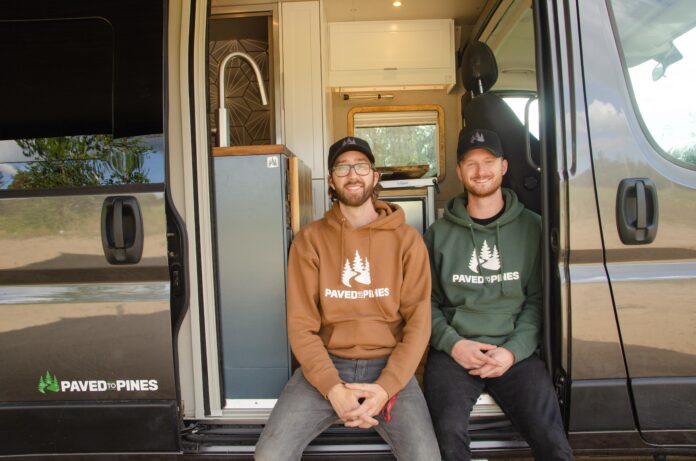
Two Prince Albert business owners faced some of Canada’s top entrepreneurs on Dragons’ Den in an episode that aired two weeks ago.
The business is called Paved to Pines, and works with customers to convert vans and buses to custom designed and built campers.
Mitchell Rosko and Steven Glass, founders of the business, met over five years ago while attending college in B.C.
“We just kind of fell in love with the outdoors and everybody around there is pretty much hippie. We camped and hiked and spent a lot of time outdoors and knew that’s something we wanted to do so we had come up with the idea for Paved to Pines,” Rosko explained.
After a couple of years, the idea started to come to life when Glass traded a motorcycle for a school bus. The two men converted the bus as their first unit and Glass lived in it for about a year just outside of Saskatoon.
From there, Glass and Rosko’s idea gained exposure and blossomed into the business it is now.
Paved to Pines is located just outside the city in Red Wing and is entering its third year of business.
Glass is originally from Saskatoon and Rosko is from Airdrie. Glass spent a year in Prince Albert playing for the Mintos, and grew up going to Emma Lake and northern Saskatchewan. The men saw the area as a good and affordable place to set up shop with access to the northern region.
Glass said there was a bit of uncertainty about how the pandemic would impact their business but the RV industry in general experienced an increase in sales.
“Obviously that being one of the only things you can do is get out in the outdoors, we ended up doubling our lineup and are booked into probably about 2022 at this point,” Glass explained.
Rosko added that Paved to Pines is “fortunate to be in the right industry at the right time.”
Glass said although the business experienced an increase in their lineup of conversions and in turn a growth in sales, they did have to deal with business out east and their suppliers closing their doors.
“A lot of our supplies were cut off which took obviously a lot of problem-solving and making sure our builds stayed on time,” Glass said.
A producer from Dragons’ Den reached out to Rosko and Glass after coming across their website.
Glass and Rosko both grew up watching Dragons’ Den and have talked about going on the show to pitch their business. They filmed their pitch at the end of August in a satellite studio in Edmonton.
The business owners asked the dragons for $200,000 for 10 per cent of their company. The episode premiered on Dec. 17 and can be found at https://www.cbc.ca/dragonsden/m_pitches/paved-to-pines.
Unfortunately, none of the dragons ended up investing in the business, but entrepreneur Lane Merrifield said he will “most likely be a customer at some point.”
Although it wasn’t the outcome they were hoping for, Glass said the dragons offered a lot of good advice, some that didn’t make it to air, about the process of scaling their business and what would be good moves for the future.
“Honestly just the exposure and the experience was huge for both Mitchell and I and Paved to Pines. Our guys are incredible, our team (has) super skilled trades guys and I think this gave them a lot of exposure,” Glass said.
Rosko said they have already started to implement some of the dragon’s advice at Paved to Pines and it’s already paid off.
Some of Merrifield’s advice was that since the business has such a busy line up and is doing well booking jobs, it’s time to increase prices and charging more for what people are interested in.
“We’ve made a few changes to our budgets and quoting process and that’s definitely led to an influx of profit on our builds,” Glass said.
Prospective customers can reach out to Paved to Pines through their website (pavedtopines.com) or on social media where they’ll be directed to a web form. The form gathers information about what the customer is looking for and is how Glass and Rosko come up with a ballpark quote. From there, the process of coming up with a more concrete quote and designing and building the conversion begins.
The average price of a van conversion ranges from $75,000 to $100,000. The average price of a bus conversion sized 37 to 40 feet is $110,000 to $130,000.
The price doesn’t include the cost of the vehicle, which Rosko and Glass can help customers find.
Owning a van conversion business isn’t something either Glass or Rosko saw themselves doing when they were younger.
“I don’t think anybody ever grows up and says ‘I want to create buses that turn into motorhomes for a living’,” Rosko said.
He added that he wanted to go into business and Glass was looking into studying medicine.
Rosko said the team hopes to scale up their lineup of builds. Currently, they’re working on two units at a time and he thinks by this time next year, they’ll hopefully double that by building four units at a time.
“Our plans for the future are to just keep growing and then making this more widely available to people rather than just having to buy cookie cutter RVs from these mass manufacturers that have inferior products than ours,” Rosko said.

